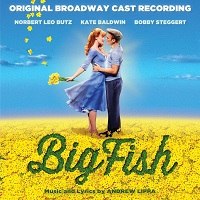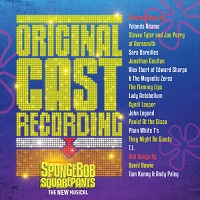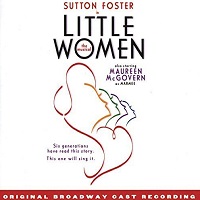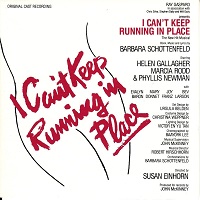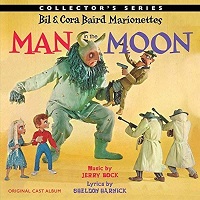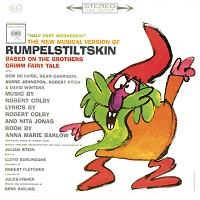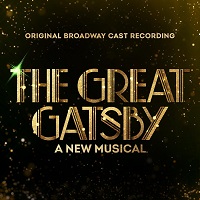 Original Broadway Cast, 2024 (Sony Masterworks Broadway)
Original Broadway Cast, 2024 (Sony Masterworks Broadway)  (0.5 / 5) As F. Scott Fitzgerald’s famous and revered novel The Great Gatsby lapsed into the public domain, it was perhaps inevitable that stage adaptations would begin to appear. This musical version had the good fortune of employing two extremely talented vocalists, Jeremy Jordan (Newsies, Bonnie and Clyde, etc. ) as Jay Gatsby and Eva Noblezada (Miss Saigon, Hadestown) as Daisy Buchanan. Noblezada was cast against type for this role, yet she comes across better than Jordan on the recording, finding genuine emotion in songs such as “For Better or Worse” and “Beautiful Little Fool.” Though Jordan’s singing voice is distinctive in ballads including “For Her,” his accent in his spoken dialogue sounds out of place. And while John Zdrojeski and Sara Chase are well cast as Tom Buchanan and Myrtle, respectively, Noah Ricketts struggles in the role of Nick. The story of Gatsby’s pursuit of the married Daisy is narrated in the novel and the musical by Nick, who has just returned home from serving in World War I, and who also plays a key role in the unfolding drama as he carries on a romance with professional golfer Jordan Baker (Samantha Pauly). Nick is the audience’s reporter on the show’s primary subjects and themes: the tragedy hidden behind the decadence of the Roaring ’20s in America, the life of the mysterious Gatsby, and the everlasting hope or the unreachable dream represented by a single green light in the distance. But narration is much more difficult to execute in a stage show than in a novel, and Nick’s lines often feel shoehorned into the musical. The score for this version was written by Jason Howland (music) and Nathan Tysen (lyrics), and the book by Kait Kerrigan. Howland is not untalented; his melodies for the songs “For Her,” “Only Tea,” and “Past is Catching Up to Me” are enjoyable, and “My Green Light” plays well as the obligatory, highly-anticipated duet between the two leads. But some of Tysen’s lyrics are of shockingly poor quality. For example, in the song “One-Way Road,” a pregnant Myrtle sings “Though I’m not showing, a baby’s growing,” along with “He’s mine, and this baby here is genuine.” Lyrics like these prevent the recording from gaining any real momentum, and further, the score as a whole is structured so generically that some listeners may be able to predict the type and style of each successive song before it plays. It’s likely that the standout visuals of this show’s physical production and the presence of two bankable musical theater notables keep the party moving well enough on stage, but this Great Gatsby‘s lack of nuance is clear from the cast album, especially in comparison to its source material. — Forrest Hutchinson
(0.5 / 5) As F. Scott Fitzgerald’s famous and revered novel The Great Gatsby lapsed into the public domain, it was perhaps inevitable that stage adaptations would begin to appear. This musical version had the good fortune of employing two extremely talented vocalists, Jeremy Jordan (Newsies, Bonnie and Clyde, etc. ) as Jay Gatsby and Eva Noblezada (Miss Saigon, Hadestown) as Daisy Buchanan. Noblezada was cast against type for this role, yet she comes across better than Jordan on the recording, finding genuine emotion in songs such as “For Better or Worse” and “Beautiful Little Fool.” Though Jordan’s singing voice is distinctive in ballads including “For Her,” his accent in his spoken dialogue sounds out of place. And while John Zdrojeski and Sara Chase are well cast as Tom Buchanan and Myrtle, respectively, Noah Ricketts struggles in the role of Nick. The story of Gatsby’s pursuit of the married Daisy is narrated in the novel and the musical by Nick, who has just returned home from serving in World War I, and who also plays a key role in the unfolding drama as he carries on a romance with professional golfer Jordan Baker (Samantha Pauly). Nick is the audience’s reporter on the show’s primary subjects and themes: the tragedy hidden behind the decadence of the Roaring ’20s in America, the life of the mysterious Gatsby, and the everlasting hope or the unreachable dream represented by a single green light in the distance. But narration is much more difficult to execute in a stage show than in a novel, and Nick’s lines often feel shoehorned into the musical. The score for this version was written by Jason Howland (music) and Nathan Tysen (lyrics), and the book by Kait Kerrigan. Howland is not untalented; his melodies for the songs “For Her,” “Only Tea,” and “Past is Catching Up to Me” are enjoyable, and “My Green Light” plays well as the obligatory, highly-anticipated duet between the two leads. But some of Tysen’s lyrics are of shockingly poor quality. For example, in the song “One-Way Road,” a pregnant Myrtle sings “Though I’m not showing, a baby’s growing,” along with “He’s mine, and this baby here is genuine.” Lyrics like these prevent the recording from gaining any real momentum, and further, the score as a whole is structured so generically that some listeners may be able to predict the type and style of each successive song before it plays. It’s likely that the standout visuals of this show’s physical production and the presence of two bankable musical theater notables keep the party moving well enough on stage, but this Great Gatsby‘s lack of nuance is clear from the cast album, especially in comparison to its source material. — Forrest Hutchinson



 (3.5 / 5) Teeming with interesting ideas about ethics, journalism, the generation gap, and sexism, The Connector presents its audience with a key question: Would you rather read the facts, or the “truth?” Daisy Prince was a major creative force behind the show, which she directed Off-Broadway in early 2024. Jason Robert Brown provided the music and lyrics, and Jonathan Marc Sherman wrote the book. All three were inspired by the true stories of Stephen Glass and Jayson Blair, who respectively duped The New Republic and The New York Times into publishing articles that were partly fabricated or, in some cases, completely false. Ben Levi Ross leads the company as Ethan Dobson, the charismatic but duplicitous reporter at the center of the story, and his vocal talent is one of the greatest strengths of this recording. He is matched by Hannah Cruz in the role of Robin Martinez, a fellow journalist who quickly becomes suspicious of Ethan’s articles. Also on hand are stage veterans Scott Bakula and Jessica Molaskey, paired well with the newcomers. Bakula plays the jaded editor in chief of The Connector, and his wry rendition of the song “Now What?” reflects the divide between the older and younger generations; Molaskey is wonderful as the magazine’s longest-tenured fact checker, the first member of the staff to see through Ethan’s facade. In a humorous role, Max Crumm plays the subject of one of the fabricated articles, a West Village hustler whose game of choice is Scrabble. The show’s writers have given the cast powerful material in songs such as “Proof,” “The Western Wall,” and “There Never Was.” Brown’s score is appropriately varied and tuneful, and certainly reflective of the show’s setting in the 1990s; if it’s not as catchy as some of his previous work, his lyrics will be sure to stick with listeners and make them think. The final song is haunting as it derides the ethics of modern journalism and the gullible nature of the public with the searing line: “We believe what we believe, and all we want is someone to confirm it.” In the age of “fake news,” “alternative facts,” and unregulated online information sources, this recording is a timely listen. — Forrest Hutchinson
(3.5 / 5) Teeming with interesting ideas about ethics, journalism, the generation gap, and sexism, The Connector presents its audience with a key question: Would you rather read the facts, or the “truth?” Daisy Prince was a major creative force behind the show, which she directed Off-Broadway in early 2024. Jason Robert Brown provided the music and lyrics, and Jonathan Marc Sherman wrote the book. All three were inspired by the true stories of Stephen Glass and Jayson Blair, who respectively duped The New Republic and The New York Times into publishing articles that were partly fabricated or, in some cases, completely false. Ben Levi Ross leads the company as Ethan Dobson, the charismatic but duplicitous reporter at the center of the story, and his vocal talent is one of the greatest strengths of this recording. He is matched by Hannah Cruz in the role of Robin Martinez, a fellow journalist who quickly becomes suspicious of Ethan’s articles. Also on hand are stage veterans Scott Bakula and Jessica Molaskey, paired well with the newcomers. Bakula plays the jaded editor in chief of The Connector, and his wry rendition of the song “Now What?” reflects the divide between the older and younger generations; Molaskey is wonderful as the magazine’s longest-tenured fact checker, the first member of the staff to see through Ethan’s facade. In a humorous role, Max Crumm plays the subject of one of the fabricated articles, a West Village hustler whose game of choice is Scrabble. The show’s writers have given the cast powerful material in songs such as “Proof,” “The Western Wall,” and “There Never Was.” Brown’s score is appropriately varied and tuneful, and certainly reflective of the show’s setting in the 1990s; if it’s not as catchy as some of his previous work, his lyrics will be sure to stick with listeners and make them think. The final song is haunting as it derides the ethics of modern journalism and the gullible nature of the public with the searing line: “We believe what we believe, and all we want is someone to confirm it.” In the age of “fake news,” “alternative facts,” and unregulated online information sources, this recording is a timely listen. — Forrest Hutchinson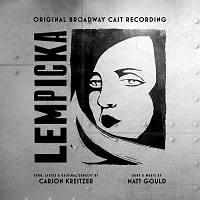
 (1 / 5) Fans hailed Eden Espinosa’s return to Broadway in Lempicka and fawned over pre-released songs from the score, such as “Woman Is,”’ that showed off her powerful vocal instrument. Unfortunately, the show was a dud — an unfocused and unpleasant musical that appeared to be far more interested in the soap opera aspects of the title character’s life than her art. First-time listeners to this cast recording might be taken aback by the techno music and harsh orchestrations used in the overture, especially if they have any background knowledge about the show’s subject: Polish painter Tamara de Lempicka, whose most notable works were completed in the 1920s and ’30s in the Art Deco style, of which she was a pioneer. Composer Matt Gould seems to have written electronic music with rhythmic, focused beats for this score as a way of reflecting the hard-edged style of Lempicka’s art. Perhaps this is justifiable for the numbers in which Lempicka is learning to paint and developing her style, but as the show’s plot proceeds, and both her marriage and her extra-marital affair begin to fall apart, the emotional turmoil is accompanied by jarringly upbeat music more fit for a dance club. Espinosa impressively belts her way through the mediocre material, and two other pluses of the album are the textured, beautiful voices of Amber Iman and Andrew Samonsky as, respectively, Lempicka’s muse/lover and her husband, the latter doing his best with the show’s most poorly written character. These three share a love triangle that takes up most of the focus in the overstuffed plot and score. Lempicka closed very quickly on Broadway, and this recording seems unlikely to become a treasured cast album of a flop. A final note: Beth Leavel in the role of The Baroness gets one song here — the show’s 11 o’clock number, “Just This Way” — and she makes the most of it. — Forrest Hutchinson
(1 / 5) Fans hailed Eden Espinosa’s return to Broadway in Lempicka and fawned over pre-released songs from the score, such as “Woman Is,”’ that showed off her powerful vocal instrument. Unfortunately, the show was a dud — an unfocused and unpleasant musical that appeared to be far more interested in the soap opera aspects of the title character’s life than her art. First-time listeners to this cast recording might be taken aback by the techno music and harsh orchestrations used in the overture, especially if they have any background knowledge about the show’s subject: Polish painter Tamara de Lempicka, whose most notable works were completed in the 1920s and ’30s in the Art Deco style, of which she was a pioneer. Composer Matt Gould seems to have written electronic music with rhythmic, focused beats for this score as a way of reflecting the hard-edged style of Lempicka’s art. Perhaps this is justifiable for the numbers in which Lempicka is learning to paint and developing her style, but as the show’s plot proceeds, and both her marriage and her extra-marital affair begin to fall apart, the emotional turmoil is accompanied by jarringly upbeat music more fit for a dance club. Espinosa impressively belts her way through the mediocre material, and two other pluses of the album are the textured, beautiful voices of Amber Iman and Andrew Samonsky as, respectively, Lempicka’s muse/lover and her husband, the latter doing his best with the show’s most poorly written character. These three share a love triangle that takes up most of the focus in the overstuffed plot and score. Lempicka closed very quickly on Broadway, and this recording seems unlikely to become a treasured cast album of a flop. A final note: Beth Leavel in the role of The Baroness gets one song here — the show’s 11 o’clock number, “Just This Way” — and she makes the most of it. — Forrest Hutchinson
 (4 / 5) As originally presented on the tiny stage of an intimate nightclub on the Upper West Side of Manhattan, Disaster! was a hilariously funny, spot-on spoof of both the epic disaster movies of the 1970s (The Poseidon Adventure, Earthquake, et al.) and the theatrical genre that has come to be known as “the jukebox musical,” in which pre-existing pop songs are shoved willy-nilly into a “plot” written around them. Sadly, the show had a very brief run on Broadway, where its intentionally bargain-basement production values were apparently not appreciated — this despite a cast that included such adept musical comedians as Roger Bart, Kerry Butler, Kevin Chamberlin, Faith Prince, Rachel York, and the brilliant Jennifer Simard in the scene-stealing role of a nun with a gambling addiction. But if that production couldn’t muster more than 104 performances in total, the cast album provides ample evidence that the show itself is a fabulously entertaining riot and would likely be hugely popular with audiences if presented by community, regional, and summer theaters, high schools, and colleges. Set up in the opening number, “Hot Stuff,” the perfectly ridiculous story that Seth Rudetsky, Jack Plotnick, and Drew Geraci concocted to contain dozens of pop hits of the ’70s concerns a professor (Rudetsky) who attempts in vain to warn against an impending earthquake that threatens a floating casino/discotheque. Heard during the course of the gloriously loopy proceedings are such deathless songs as “Theme from Mahagony,” “Saturday Night,” “I Am Woman/That’s the Way I’ve Heard it Should Be,” “Never Can Say Goodbye,” “Feelings,” “Three Times a Lady,” “Don’t Cry Out Loud,” and about 20 others — but, cannily, almost none of these are performed complete. Rather, they stick around just long enough to make their comic and nostalgic points, then disappear back into the musical ether. If we can all agree that the highlight of the album is Simard’s magnificently toneless rendition of “The Lord’s Prayer” (remember that one?!), there are many other musically and/or comically excellent tracks here, featuring the personnel named above as well as such other worthies as Adam Pascal, Max Crumm, Manoel Felciano, Lacretta Nicole, Paul Castree, and the budding young talent Baylee Littrell in the dual role of 11-year-old twins Ben and Lisa. Throughout, the sounds of the ’70s are expertly aped by orchestrators/arrangers Joseph Joubert and Seth Rudetsky (wearing yet another hat), vocal arranger Michael McElroy, and dance arranger David Dabbon, all under the crack musical direction of Steve Marzullo. Party on! — Michael Portantiere
(4 / 5) As originally presented on the tiny stage of an intimate nightclub on the Upper West Side of Manhattan, Disaster! was a hilariously funny, spot-on spoof of both the epic disaster movies of the 1970s (The Poseidon Adventure, Earthquake, et al.) and the theatrical genre that has come to be known as “the jukebox musical,” in which pre-existing pop songs are shoved willy-nilly into a “plot” written around them. Sadly, the show had a very brief run on Broadway, where its intentionally bargain-basement production values were apparently not appreciated — this despite a cast that included such adept musical comedians as Roger Bart, Kerry Butler, Kevin Chamberlin, Faith Prince, Rachel York, and the brilliant Jennifer Simard in the scene-stealing role of a nun with a gambling addiction. But if that production couldn’t muster more than 104 performances in total, the cast album provides ample evidence that the show itself is a fabulously entertaining riot and would likely be hugely popular with audiences if presented by community, regional, and summer theaters, high schools, and colleges. Set up in the opening number, “Hot Stuff,” the perfectly ridiculous story that Seth Rudetsky, Jack Plotnick, and Drew Geraci concocted to contain dozens of pop hits of the ’70s concerns a professor (Rudetsky) who attempts in vain to warn against an impending earthquake that threatens a floating casino/discotheque. Heard during the course of the gloriously loopy proceedings are such deathless songs as “Theme from Mahagony,” “Saturday Night,” “I Am Woman/That’s the Way I’ve Heard it Should Be,” “Never Can Say Goodbye,” “Feelings,” “Three Times a Lady,” “Don’t Cry Out Loud,” and about 20 others — but, cannily, almost none of these are performed complete. Rather, they stick around just long enough to make their comic and nostalgic points, then disappear back into the musical ether. If we can all agree that the highlight of the album is Simard’s magnificently toneless rendition of “The Lord’s Prayer” (remember that one?!), there are many other musically and/or comically excellent tracks here, featuring the personnel named above as well as such other worthies as Adam Pascal, Max Crumm, Manoel Felciano, Lacretta Nicole, Paul Castree, and the budding young talent Baylee Littrell in the dual role of 11-year-old twins Ben and Lisa. Throughout, the sounds of the ’70s are expertly aped by orchestrators/arrangers Joseph Joubert and Seth Rudetsky (wearing yet another hat), vocal arranger Michael McElroy, and dance arranger David Dabbon, all under the crack musical direction of Steve Marzullo. Party on! — Michael Portantiere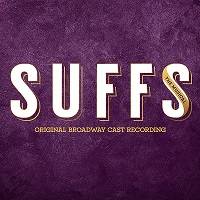
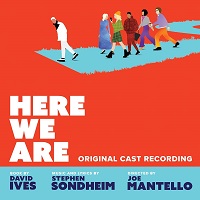
 (4.5 / 5) As staged Off-Broadway at The Shed in late 2023, Sondheim’s final musical — which combines two Luis Buñuel films to create one story about a group of wealthy friends who struggle all day to find a place to eat and then can’t leave the room — offered strange, surreal satisfaction. The cast album of Here We Are captures the show’s bizarreness while still showcasing the small-scale treasures of Sondheim’s last songs. The wise inclusion on the recording of significant patches of David Ives’ book scenes (there is very little music in the second act) helps to capture the show’s shifting flavors, even if parts of the story will likely remain inscrutable to some listeners. Sondheim’s music sometimes goes beyond evoking his past work; certain sections seem to quote Passion and Sunday in the Park with George outright. But there are worse things than revisiting some of his most wistful melodic gestures, and there are moments in this score that suggest a self-referential wink, too. His lyrics remain outstandingly specific to character in their rhythms, vocabulary, and grammar, particularly in the comic “Bishop’s Song” for a character (played by David Hyde Pierce) who would rather be working in another field, and in the show’s most glistening addition to the canon, the aria “Shine” for Marianne (Rachel Bay Jones). “I want things to gleam / To be what they seem / And not what they are,” she sings in one of Sondheim’s last perfect constructions. It’s not his most densely rhymed score, nor his most unimpeachable; for example, a parodically mournful ballad, “It Is What It Is,” for Tracie Bennett (doing a ridiculous French accent), misfires on the recording as it did onstage. But Sondheim clearly relishes the unique weirdnesses of each of his characters, and sometimes gives them notably lush, romantic melodies as in “The Soldier’s Dream,” sung brightly by Jin Ha and Micaela Diamond. (The most frustrating aspect of the album is how often the richest music is interrupted by spoken asides referencing stage business by other characters, doing little to clarify or enrich those moments.) While Here We Are is a true ensemble piece, Jones is especially delightful in animating Marianne’s willful ignorance masquerading as innocence, and lovely as she sounds when singing, it’s the recorded book scenes that demonstrate the complexities she squeezes out of a defiantly superficial character, as when she makes a meal out of delicious consonants in sultry, silly lines such as “I found you a credenza for your embassy.” Perhaps more than anything else, this score in album form is a testament to the 50-year-plus collaboration between orchestrator Jonathan Tunick and Sondheim. The recording not only exquisitely communicates Tunick’s sumptuous, quirky, and always dramatically motivated treatment of Sondheim’s compositions but also demonstrates, through the inclusion of several Act II interludes and the substantial, shimmering exit music, how lovingly Tunick developed those melodies in instrumental sections presumably constructed after Sondheim’s death. (The entr’acte, for instance, fleshes out a gorgeous, brief melody sung by Steven Pasquale in “The Road 4 — Part 2.”) When it comes to that partnership, to quote Marianne, “Don’t we all feel blessed?” — Dan Rubins
(4.5 / 5) As staged Off-Broadway at The Shed in late 2023, Sondheim’s final musical — which combines two Luis Buñuel films to create one story about a group of wealthy friends who struggle all day to find a place to eat and then can’t leave the room — offered strange, surreal satisfaction. The cast album of Here We Are captures the show’s bizarreness while still showcasing the small-scale treasures of Sondheim’s last songs. The wise inclusion on the recording of significant patches of David Ives’ book scenes (there is very little music in the second act) helps to capture the show’s shifting flavors, even if parts of the story will likely remain inscrutable to some listeners. Sondheim’s music sometimes goes beyond evoking his past work; certain sections seem to quote Passion and Sunday in the Park with George outright. But there are worse things than revisiting some of his most wistful melodic gestures, and there are moments in this score that suggest a self-referential wink, too. His lyrics remain outstandingly specific to character in their rhythms, vocabulary, and grammar, particularly in the comic “Bishop’s Song” for a character (played by David Hyde Pierce) who would rather be working in another field, and in the show’s most glistening addition to the canon, the aria “Shine” for Marianne (Rachel Bay Jones). “I want things to gleam / To be what they seem / And not what they are,” she sings in one of Sondheim’s last perfect constructions. It’s not his most densely rhymed score, nor his most unimpeachable; for example, a parodically mournful ballad, “It Is What It Is,” for Tracie Bennett (doing a ridiculous French accent), misfires on the recording as it did onstage. But Sondheim clearly relishes the unique weirdnesses of each of his characters, and sometimes gives them notably lush, romantic melodies as in “The Soldier’s Dream,” sung brightly by Jin Ha and Micaela Diamond. (The most frustrating aspect of the album is how often the richest music is interrupted by spoken asides referencing stage business by other characters, doing little to clarify or enrich those moments.) While Here We Are is a true ensemble piece, Jones is especially delightful in animating Marianne’s willful ignorance masquerading as innocence, and lovely as she sounds when singing, it’s the recorded book scenes that demonstrate the complexities she squeezes out of a defiantly superficial character, as when she makes a meal out of delicious consonants in sultry, silly lines such as “I found you a credenza for your embassy.” Perhaps more than anything else, this score in album form is a testament to the 50-year-plus collaboration between orchestrator Jonathan Tunick and Sondheim. The recording not only exquisitely communicates Tunick’s sumptuous, quirky, and always dramatically motivated treatment of Sondheim’s compositions but also demonstrates, through the inclusion of several Act II interludes and the substantial, shimmering exit music, how lovingly Tunick developed those melodies in instrumental sections presumably constructed after Sondheim’s death. (The entr’acte, for instance, fleshes out a gorgeous, brief melody sung by Steven Pasquale in “The Road 4 — Part 2.”) When it comes to that partnership, to quote Marianne, “Don’t we all feel blessed?” — Dan Rubins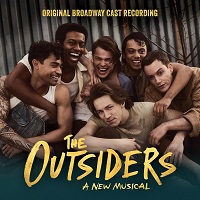
 (3 / 5)
(3 / 5) 
 (2.5 / 5) Scott Brown and Anthony King developed this two-person comic gem about two composers writing a musical. The fictional writers have created a show portraying Johannes Gutenberg and the invention of the printing press to help a town’s illiterate populace. This recording features in the roles of the two aspiring writers Christopher Fitzgerald as Bud Davenport and Jeremy Shamos as Doug Simon. Bud and Doug are very sincere, but their show is very bad. Nevertheless, they are pitching it to audiences and (they hope) to “famous Broadway producers.” Unfortunately, since this is just a reading and they don’t have a cast yet, Bud and Doug are forced to play all of the parts themselves, including the title role as well as an evil monk, a lovely young woman (aptly named Helvetica), and all of the other various townspeople. This potentially confusing premise is kept afloat by distinctive performances from Fitzgerald and Shamos, who take on unique accents and personas for each of the characters. On stage, the actors would don hats bearing the character names or descriptions to help make it clear to the audience whom they were playing at any given moment, speedily switching from one to another, and while these visual gags can’t be seen on the recording, it’s a credit to the duo that listeners could almost forget that this was a two-person show when listening through the cast album. While the material is enjoyable, it is slight; the comedy is hit-or-miss, and there are crass jokes about dead babies, anti-Semitic flower girls, and even suicide. In the end, the songs most often prompt unfavorable comparisons to other scores: for example, Urinetown comments on itself more cleverly, while [title of show] breaks the fourth wall more effectively. Still, the “plot” of Gutenberg! The Musical is delightfully wacky, crazy enough to keep you laughing but just grounded enough to make you think that someone out there might possibly think the show within this show would be a good idea. — Forrest Hutchinson
(2.5 / 5) Scott Brown and Anthony King developed this two-person comic gem about two composers writing a musical. The fictional writers have created a show portraying Johannes Gutenberg and the invention of the printing press to help a town’s illiterate populace. This recording features in the roles of the two aspiring writers Christopher Fitzgerald as Bud Davenport and Jeremy Shamos as Doug Simon. Bud and Doug are very sincere, but their show is very bad. Nevertheless, they are pitching it to audiences and (they hope) to “famous Broadway producers.” Unfortunately, since this is just a reading and they don’t have a cast yet, Bud and Doug are forced to play all of the parts themselves, including the title role as well as an evil monk, a lovely young woman (aptly named Helvetica), and all of the other various townspeople. This potentially confusing premise is kept afloat by distinctive performances from Fitzgerald and Shamos, who take on unique accents and personas for each of the characters. On stage, the actors would don hats bearing the character names or descriptions to help make it clear to the audience whom they were playing at any given moment, speedily switching from one to another, and while these visual gags can’t be seen on the recording, it’s a credit to the duo that listeners could almost forget that this was a two-person show when listening through the cast album. While the material is enjoyable, it is slight; the comedy is hit-or-miss, and there are crass jokes about dead babies, anti-Semitic flower girls, and even suicide. In the end, the songs most often prompt unfavorable comparisons to other scores: for example, Urinetown comments on itself more cleverly, while [title of show] breaks the fourth wall more effectively. Still, the “plot” of Gutenberg! The Musical is delightfully wacky, crazy enough to keep you laughing but just grounded enough to make you think that someone out there might possibly think the show within this show would be a good idea. — Forrest Hutchinson
 (2 / 5) The first Broadway production of Gutenberg! reunited former Book of Mormon co-stars Andrew Rannells and Josh Gad, giving them another excellent vehicle to showcase their comedic chemistry and range. As is typical when an Off-Broadway show goes to Broadway, there were some things lost, some things gained. This cast album is longer than the Off-Broadway recording, which at 58 minutes in length was already threatening to outwear its welcome. The additional 10 minutes of material to be found here strain a listener’s goodwill. On the other hand, the spoken dialogue that’s included has been cleverly modified to address listeners to the recording rather than live audience members, and the new jokes are mostly an improvement over those in the previous iteration. Most likely, one’s enjoyment of this album will be closely linked to one’s affinity for Rannells and Gad. They are appropriately earnest as Bud and Doug. and fully committed to each of their bit parts. The best songs are Helvetica’s love ballad, “I Can’t Read,” which contains some expert comedy lyrics; the stereotypical Act 1 Finale, “Tomorrow Is Tonight”; and the deliciously evil “Monk With Me.” On Broadway, the show featured different celebrity guest stars at each performance, playing the famous Broadway producer who offers Bud and Doug their Broadway contract. Mel Brooks was chosen to appear in that brief role on the album, and he’s a wonderful choice for it. — F.H.
(2 / 5) The first Broadway production of Gutenberg! reunited former Book of Mormon co-stars Andrew Rannells and Josh Gad, giving them another excellent vehicle to showcase their comedic chemistry and range. As is typical when an Off-Broadway show goes to Broadway, there were some things lost, some things gained. This cast album is longer than the Off-Broadway recording, which at 58 minutes in length was already threatening to outwear its welcome. The additional 10 minutes of material to be found here strain a listener’s goodwill. On the other hand, the spoken dialogue that’s included has been cleverly modified to address listeners to the recording rather than live audience members, and the new jokes are mostly an improvement over those in the previous iteration. Most likely, one’s enjoyment of this album will be closely linked to one’s affinity for Rannells and Gad. They are appropriately earnest as Bud and Doug. and fully committed to each of their bit parts. The best songs are Helvetica’s love ballad, “I Can’t Read,” which contains some expert comedy lyrics; the stereotypical Act 1 Finale, “Tomorrow Is Tonight”; and the deliciously evil “Monk With Me.” On Broadway, the show featured different celebrity guest stars at each performance, playing the famous Broadway producer who offers Bud and Doug their Broadway contract. Mel Brooks was chosen to appear in that brief role on the album, and he’s a wonderful choice for it. — F.H.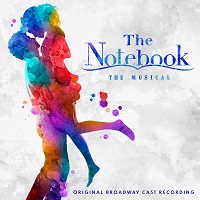
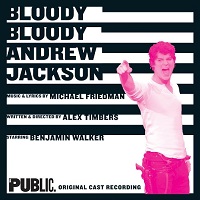
 (1.5 / 5) Before Hamilton took the world by storm in 2016 with a musical style previously underrepresented on Broadway and a story featuring American historical figures, composer-lyricist Michael Friedman and book writer Alex Timbers utilized similar elements to create Bloody Bloody Andrew Jackson in 2010. The cast album was released following the musical’s successful engagement at The Public Theater and before its disappointing run of 120 performances on Broadway. If the show is certainly no Hamilton, its punk rock score still offers some genuine moments to savor. Take the opening number, “Populism Yea Yea.” Only the most hardened critics could resist banging their heads along to the catchy lyrics. And give a listen to the recording’s final track, “The Hunters of Kentucky,” for another prime example of Friedman’s ability to excite the listener. You won’t have long to wait between those two highlights; the recording is a slight 28 minutes long, making it one of the shortest cast albums ever. Bloody Bloody Andrew Jackson attempts to satirize its title character, played by Benjamin Walker, by portraying him as a foulmouthed, angsty, emo rock star. The idea is to lampoon Jackson’s most controversial decisions and actions by attributing them to his immature, reactive personality, a device that may not register when one is listening to the songs out of context. The score also makes the mistake of glamorizing Jackson’s emotionality as the show goes on, depriving the satire of its bite. Additionally, it should be noted that the original production was widely criticized by Native American activist groups, and subsequent productions have been protested, due to the material’s perceived insensitivity in its depiction of historical events. Comparisons to Hamilton only go so far, given Bloody Bloody Andrew Jackson‘s lack of nuance and the disparity in quality between the two scores. — Forrest Hutchinson
(1.5 / 5) Before Hamilton took the world by storm in 2016 with a musical style previously underrepresented on Broadway and a story featuring American historical figures, composer-lyricist Michael Friedman and book writer Alex Timbers utilized similar elements to create Bloody Bloody Andrew Jackson in 2010. The cast album was released following the musical’s successful engagement at The Public Theater and before its disappointing run of 120 performances on Broadway. If the show is certainly no Hamilton, its punk rock score still offers some genuine moments to savor. Take the opening number, “Populism Yea Yea.” Only the most hardened critics could resist banging their heads along to the catchy lyrics. And give a listen to the recording’s final track, “The Hunters of Kentucky,” for another prime example of Friedman’s ability to excite the listener. You won’t have long to wait between those two highlights; the recording is a slight 28 minutes long, making it one of the shortest cast albums ever. Bloody Bloody Andrew Jackson attempts to satirize its title character, played by Benjamin Walker, by portraying him as a foulmouthed, angsty, emo rock star. The idea is to lampoon Jackson’s most controversial decisions and actions by attributing them to his immature, reactive personality, a device that may not register when one is listening to the songs out of context. The score also makes the mistake of glamorizing Jackson’s emotionality as the show goes on, depriving the satire of its bite. Additionally, it should be noted that the original production was widely criticized by Native American activist groups, and subsequent productions have been protested, due to the material’s perceived insensitivity in its depiction of historical events. Comparisons to Hamilton only go so far, given Bloody Bloody Andrew Jackson‘s lack of nuance and the disparity in quality between the two scores. — Forrest Hutchinson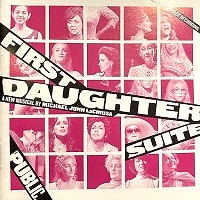
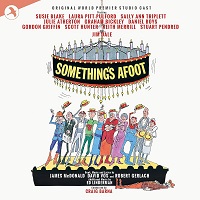
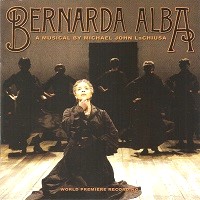 Off-Broadway Cast,
Off-Broadway Cast, 